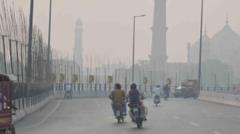The Pakistani city of Lahore, grappling with record levels of air pollution, has closed all primary schools for a week starting Monday. The air quality index surpassed 1,000 on Saturday, a staggering rise above the 300 mark deemed "dangerous" by the World Health Organization. In response, authorities have implemented a "green lockdown" strategy, which includes a mandate for 50% of office workers to work from home.
Punjab Senior Minister Marriyum Aurangzeb highlighted the risks associated with the conversion to such hazardous conditions, particularly for children. "This smog is very harmful for children. Masks should be mandatory in schools," she stated. Accompanying the school closures are bans on certain vehicle types, such as engine-powered rickshaws, along with restrictions on vendors using barbecues that lack pollution controls.
The source of the airborne toxins is linked to numerous practices, notably the burning of stubble across the Indian border. Raja Jehangir Anwar, a senior environment official, identified this activity as the primary contributor to Lahore's air quality crisis, exacerbated by strong winds transporting the fumes into Pakistan. Aurangzeb echoed the need for discussions with India to address the issue.
Residents are being advised to minimize outdoor activities and avoid unnecessary travel, while municipal workers are actively spraying water into the atmosphere to curtail pollution levels. Some construction projects have been paused as officials assess the situation weekly to determine if schools should remain closed.
Health experts, including those from the WHO, warn about the severe health consequences resulting from prolonged inhalation of toxic air, linking it to major illnesses such as strokes, lung cancer, and respiratory diseases. Last month, school policies were adjusted to prohibit outdoor exercises until January and to modify school hours to protect children from peak pollution periods.
"The current circumstances instill anxiety in me as a mother," expressed 42-year-old Lilly Mirza. "This situation is notably worse than last year... Something drastic must have happened for it to be this extreme." The situation is typical in winter seasons when colder air traps pollutants closer to ground levels, aggravating the smog crisis facing Pakistan.



















